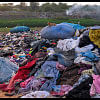Eid shopping remorse over consumerism

Eid is the occasion for which Muslims do most of their shopping for new apparel.
Businesses launch new collections, the words "Eid discount" become ubiquitous, and online pages go haywire with constant stock updates and pre-order announcements.
Despite the offers and discounts, Eid shopping doesn't seem to get any easier on our wallets. Food prices hike up starting from the very beginning of Ramadan, and everything else follows suit. More often than not, we turn over the price tag and end up leaving that one thing that caught our eye back in its place. When we don't, it's not uncommon to feel the crushing sense of guilt that comes from buying something above our budget. Even when we stay within the predetermined budget, the feeling that the dress we got should not cost as much may still linger. These weighty feelings may be even more intense for those of us who aren't financially independent and are funded by our parents.
In this economy, consumer guilt tends to sour the happy experience that Eid shopping should be.
Wanting new clothes for Eid should not weigh on your conscience. In Islam, while it is not obligatory, it's recommended that you dress up for the occasion. If you're not religious, it's a cultural and nostalgic practise to do so. It's a nice feeling we all deserve.
With a little strategy, we can forego the guilt and keep the Eid shopping. For example, through buying outfits that we will be able to use often. Nothing causes consumer guilt as strongly as buying something with an exorbitant price tag and using it only a couple of times. Not to say you shouldn't own one or two special pieces of clothing, but to avoid overspending, it might be a good idea to prioritise buying items that are appropriate for a range of events.
Making a list of what we need in order of importance also helps. If we buy the most important things first, we are less likely to go over budget as we can simply forego the less important items in case of having to tighten the purse strings.
Another way to save some bucks is through buying from local brands and artisans. We've all seen the memes going around about Pakistani dresses and their sky-high prices. If you have some time at your disposal, getting your dress tailor-made is also an economical decision.
Eid is a celebration to conclude the holy month of Ramadan. After a month of practising self-restraint and spirituality, you don't need to feel peer pressured to buy expensive things. Completely depriving yourself is also not a great solution, so it's best to find the balance. At the end of the day, instead of overthinking the logistics, your primary focus should be to do what you must to enjoy Eid to the fullest with your loved ones.

 For all latest news, follow The Daily Star's Google News channel.
For all latest news, follow The Daily Star's Google News channel. 









Comments